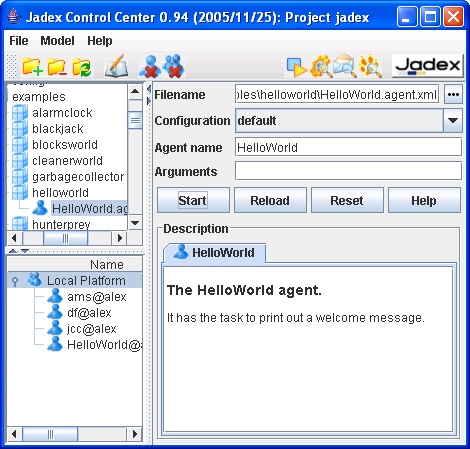The Jadex Control Center (JCC) represents the main access point for all available Jadex runtime tools. The JCC itself provides its functionalities via plugins and is therefore quite easily extensible. Currently the following plugins are shipped with the standard distribution of Jadex: Starter, Introspector, Conversation Center, and Tracer. Each tool provides its own perspective in the JCC and is described in subsequent chapters.
Main aspect of the JCC is the project handling. A project is used to store user
settings made in the JCC itself (ike window sizes or user settings) and the settings
from the various plugins. Project files consist of a main project file (ending ".jpr"
for Jadex project) and additional property files for each plugin.
In addition, the JCC uses a startup configuration, taken from the file
jcc.properties which is by default located in the user Jadex
configuration directory (%USERPROFILE%/jadex on
MS Windows™, $HOME/.jadex on
other operating systems). This properties contain a list of used plugins as well as a
pointer to the last project the user worked with. At the launch time of JCC the last
project will be automatically reopened.
Note
The Control Center is realized as Jadex agent
jadex/tools/jcc/JCC.agent.xml and is started per default
when the Standalone platform is launched. To prevent the Control Center being
started the -nogui option can be used for the Standalone
platform. Using other adapters the Control Center can be launched by simply starting
the corresponding JCC agent mentioned above.
The "File" menu provides options for loading/saving the current project settings. In addition, the currently opened project name is displayed in the JCC window's title bar (see Figure 2.1, “JCC window”). The "File/Settings" menu item allows to open the platform settings dialog described in Section 2.2, “Platform Settings”. The "File/Exit" menu item allows to close the GUI and kill the JCC agent, and optionally shutdown the whole platform. The "Help" menu provides access to the Jadex help system and the Jadex homepage.
The buttons at the right side of the toolbar  allow to switch between the
perspectives provided by the plugins (starter, introspector, conversation
center, and tracer).
The buttons on the left as well as all menus except "File" and
"Help" are dependent on the selected perspective and will be described there.
allow to switch between the
perspectives provided by the plugins (starter, introspector, conversation
center, and tracer).
The buttons on the left as well as all menus except "File" and
"Help" are dependent on the selected perspective and will be described there.
The settings dialog available from the "File" menu is used to set up diverse options for the Jadex platform and agent loading process. It is shown below in the Figure 2.2, “Platform settings dialog” and includes following options.
Expression evaluation. Jadex provides several options how to evaluate the Java expressions contained in ADFs. The built in interpreter features fast loading times, but limited runtime performance, as the Java statements have to be interpreted on every access. The interpreter allows to restart plan classes, when they have changed. This allows to try out a change in the Java code without having to reload the platform. Note, that this feature should only used for debugging, as it slows down the system. The alternative to the interpreter is the online compiler based on Janino, which is available from the Jadex homepage as an add-on. In order to further speed up the process of agent loading and execution, the compiled expressions may be saved directly to a cache file. The options Write to file-cache enabled and Read from file-cache enabled activate this behaviour.
XML model loading. The XML model loading section allows to influence how Jadex loads agent and capability models. When integrity checking is enabled all loaded agent and capability models are checked against a set of consistency rules (syntax of Java expressions, validity of cross references between goals and plans, etc.). The platform will refuse to start invalid agent models. The feature can be disabled to improve performance in deployed applications. To actually process the ADF and load the agent model, Jadex uses one of two XML-databinding frameworks. JiBX is a fast loader with a low memory footprint. To further improve performance the option to cache loaded models is available, which results in even faster loading times. JBind is a sophisticated mapping framework with the possibility to generate Java classes directly from the XML schema specification. Therefore JBind is the framework of choice for development purposes involving frequent changes to the XML schema.

